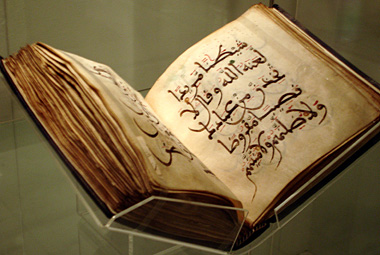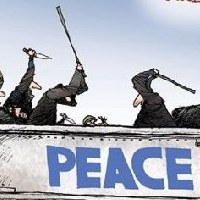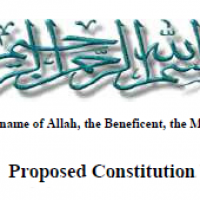![]()
Originally published (june 30, 2005) at americanthinker.com. This article was revised for answering-islam.org. You can download a comprehensive study about “What happened to the Jews of Medina” here.
Everyone knows that many millions of the Muslims in the Arab world and beyond have a deep hostility towards Jews or “the Jew.” It seems to have reached a metaphysical level or debased into an irrational state of mind.
The question is: where does the hate come from? From the anti-Israel news media? The media are powerful. So they may be a factor, partially.
Leaders in the Arab world constantly shriek that Israel is the oppressor, so this may be a factor for the hostility, but evidence that millions of average Muslims are influenced by their leaders on this matter must be brought forward, in a free and voluntary way without fear of reprisal in a dictatorship. It is difficult to imagine, for example, that barely a few of the millions of Muslims in Indonesia or Malaysia would become human bombs in Palestine or hate the Jews for this geopolitical reason. This has not happened so far, at least.
It is also revealing that the Arab Christians, who may live in or around Israel or the Palestinian Territories (the Muslims have virtually taken over Bethlehem), do not become human bombs. Why not? The short answer: Jesus never says that dying in a military holy war guarantees the “martyr” heaven, but only his death or “martyrdom” on the cross guarantees all true believers a place in heaven. The thorough answer may be read here.
So where does the deep and irrational hostility come from, especially in the Muslim Arab world?
httpv://www.youtube.com/watch?v=2H8HFb-YG00
Osama bin Laden, the dark prince of terrorism, stands in for countless other fanatics, both violent and non-violent. In fact, he represents millions of average Muslims who have given him the status of a folk hero. In a 1998 interview, though bin Laden cites the Crusader-Zionists as one source of enmity, he also says the enmity between Jews and Muslims runs more deeply in history than that.
The enmity between us and the Jews goes far back in time and is deep rooted. There is no question that war between the two of us is inevitable.
What does he mean that the enmity goes far back in time? How far back? Rooted where?
Bin Laden gives us an example of early Islamic history in his lengthy 1996 fatwa. He refers to the seventh-century Jewish tribe of Qaynuqa who lived in Medina with Muhammad the Islamic prophet. The terrorist draws inspiration from Muhammad’s expulsion of them just for a petty trick done by a Qaynuqa Jew. He pinned a Muslim woman’s skirt to a nail, and when she stood up, the skirt stayed down. A fight erupted and murders ensued. For that, Muhammad expelled the entire tribe. Therefore, as the thinking goes, bin Laden is also justified in hating the Jews because they are troublemakers.
Bin Laden gives us another example from early Islam. This message of his has a long list of irrational grievances against the Jews. He cites many verses in the Quran and the hadith (which are the reports of Muhammad’s words and actions outside of the Quran). One particular hadith that he quotes says that trees will cry out that there are Jews hiding behind them, so Muslims should come and kill them. Other traditions say that Jews will hide behind stones and then be found and killed because the stones betray them.
In his hostility towards the Jews, bin Laden believes that he is following his prophet. In a certain way, he is indeed closely following Muhammad. Bin Laden represents millions who have at least heard of these two examples (and others) of expelling and killing Jews as these reports circulate around in their world, in school curricula, in books, in popular folk belief, and in major news media outlets, like the editorial pages in newspapers. But these incidents and beliefs are found in the source documents of early Islam, as well, so they have had centuries to seep into the fabric of the Muslim world, especially the Arab Muslim world today.
This entire article seeks to demonstrate that this connection between early Islam and Islam today, at least in part, plays a profound role in the hostility that has wrapped itself around the minds of too many, not only in the Arab but the whole Muslim world. At least this much will be certain: Muhammad’s example cannot forbid Muslims from holding hatred in their hearts for Jews.
At first Muhammad lived peacefully with the Jews, shortly after his emigration or Hijrah from Mecca to Medina in AD 622. In fact, he saw himself as a reformer of Judaism. But as he pushes his ideas on to the rather large and strong Jewish communities in Medina, trouble erupted, because the Jews quite rightly refused his ideas. Muhammad quickly grows in his hostility towards them, so that he eliminates most of them from Medina, either by expulsion or death or enslavement. He becomes excessive, and this can only inspire terrorists like bin Laden and non-violent fanatics—and average Muslims.
These ruptures and hostilities take place in two overlapping domains: theology and politics, both backed by an increasingly strong military.

“Leave out the part that says ‘after we get a Palestinian state, we will kill all Jews!’ We don’t want to tip our hand!”
Theological Differences
The theological can be subdivided into five stages:
(1) Muhammad’s efforts to develop and improve on Judaism;
(2) Islam’s fulfillment of Judaism;
(3) Jewish resistance, based on Muhammad’s deficient knowledge of the Torah and gentile status;
(4) his change in prayer direction or qiblah; and
(5) Muhammad’s riposte to this resistance. The political tension and ruptures that result in warfare and conquest will be discussed afterwards, but the theological and political differences and strife parallel each other.
(1) First, while Muhammad is settling down in Medina and his position there is insecure, he tries to convince the Jews that his revelations were the continuation of Judaism (and Christianity), the religion of the People of the Book or the Bible. Before he left Mecca, he faced Syria (i.e. Jerusalem) in prayer. The early Muslims in Medina may have observed the fast for the Day of Atonement, and their special Friday worship was a response to the beginning of the Jewish Sabbath from Friday evening to Saturday evening. Muhammad forbad the Muslims from eating the same food prohibited for Jews, namely, pork, blood, carrion, and meat sacrificed to idols (see Sura 2:172-173). It seems, then, that earliest Islam was the development and even improvement on the prior faith, Judaism, or so Muhammad believed. Why would tension grow between Muhammad’s Islam and Judaism?
(2) Allah tells Muhammad in a sura (chapter) revealed in Mecca that the “unlettered” prophet (Muhammad) is described in the Torah and Gospel, and hence predicted and endorsed by the two prior religions:
7:156 “I shall ordain My mercy for those who are conscious of God and pay the prescribed alms; who believe in Our Revelations; 157 who follow the Messenger— the unlettered prophet they find described in the Torah that is with them, and in the Gospel—who commands them to do right and forbids them to do wrong, who makes good things lawful to them and bad things unlawful” . . . (MAS Abdel Haleem, The Qur’an, Oxford UP, 2004)
The literary context of these verses shows Moses rebuking the children of Israel for disobeying him. They denied God’s signs and worshiped the golden calf as Moses was coming down with the tablets of stone, inscribed with the Ten Commandments (7:145-156). Verses 156-157 imply that someone better than Moses (and Jesus) is here to guide them rightly. Muhammad declares what is lawful and unlawful and commands people to do right and forbids them to do wrong. The Jews of Muhammad’s time were getting a second chance. Would they accept it after falling away from the Torah?
(3) The Jews, however, saw things a little differently. Muhammad was not educated in the Torah. Though he had picked up some elements from the Scriptures, in bits and pieces, which were circulating around Arabia along the trade routes, his knowledge was confused. It is possible that one or two Jewish converts who had a certain level of knowledge in the Torah coached him, as well. Whatever the case, it was not hard for the Jews to contradict him. For example, in Sura 37:100-107, a Meccan sura, he believes that Abraham nearly sacrificed Ishmael, not Isaac, on the altar (though the Quran does not actually mention his name and the early Muslim sources are divided on his identity). However, Genesis 22, the only ancient source on Abraham nearly sacrificing Isaac, does not say this. For more information, see this article.
In Sura 18:60-82, another Meccan sura, he recounts fanciful tales about Moses and a servant named Khidir (so named in Islamic tradition, but not in the Quran), who got the better of Moses. For example, Khidir made him promise that he would not bring up any topic until Khidir did first. On their travels they met a boy, and Khidir killed him. Forgetting his promise, Moses challenged Khidir, but Khidir reminded him of his promise, so Moses repented. Two other such tales are recounted with the same structure. The servant acted mysteriously, Moses challenged him, so Khidir rebuked him and then clarified the hidden purpose of Allah to the baffled Hebrew prophet. Thus, Khidir revealed to him that the boy was rebellious against his parents and a disbeliever. Allah will grant the parents another son, who will behave more righteously. Compared to such a confused Moses, Muhammad is clearly better than he.
As these and other tall tales likely became known to the Jews in Medina, it was only natural for them to point out some contradictions between his revelations and their Bible. It was not difficult for them to reject him as falling outside of Biblical revelation. Besides, Muhammad was a gentile, and that in itself was enough to turn away from him. Thus, hostility grew between the two sides.
(4) The fourth stage in the theological domain is the change in prayer direction or the qiblah. Today, Muslims pray towards Mecca and the Kabah, where hundreds of thousands of pilgrims go every year. However, when Muhammad lived in Mecca, he prayed toward Jerusalem. After he arrived in Medina at the end of his Emigration in 622, he still prayed towards Jerusalem. Sixteen months later (February 624, one month before the Battle of Badr), he received revelation from on high to change direction toward the Kabah (Sura 2:122-129; 142-147). How did this come about?
Four factors explain the change or the need for this timely revelation.
First, after Muhammad settled in Medina, he found, as noted, a powerful Jewish presence in his new city. He saw himself as a prophet in the Biblical tradition, but tension between him and the Jews reached a boiling point. So he changed his qiblah towards the Kabah in Mecca. Then, the Jews challenged the prophet: if Muhammad were the new representative of Judaism and monotheism, why was he praying toward the Kabah, which was dedicated to polytheism? He then got a revelation that gave him permission.
The second factor is a partial answer to the challenge from the Jews. He believed that Abraham had built and purified the shrine, so it does not belong to the polytheists, but to him (Suras 2:122-129; 8:34-38). He was the best representative of true monotheism, and he was the one honoring Abraham.
The third concerns the Arab custom of raids. After one year of fruitless raids on Meccan caravans in 623, finally in January 624 Muhammad’s jihadists got a lucky strike, capturing a caravan near Mecca, spilling blood in a sacred month. When they brought the spoils back to Medina, the non-Muslim Medinans were understandably upset because they knew the Meccans could not let their defeat and Muhammad’s violation of a sacred month stand. Conflict would have to escalate in order to restore the Meccans’ honor. What was his justification?
Fourth, besides his theological belief that Abraham built the Kabah, it must not be overlooked that the shrine was a popular site of pilgrimage in the Arabian Peninsula, so it generated a lot of income. Since early Islam is expansionist, Muhammad could not let the Kabah alone until “religion becomes that of Allah” (Sura 2:193, Fakhry, An Interpretation of the Qur’an, NYUP, 2000, 2004). It must become a site of pilgrimage and support for Muslims, as Muhammad himself admits:
“God has made the Kabah—the Sacred House—a means of support for people” . . . (Sura 5:97, Haleem).
So it is in the historical context of the tension with the Jews in Medina, his unassailable (but unfounded) belief that Abraham built and purified the Kabah, the raids on Meccan caravans, and the Kabah’s popularity that Muhammad turned his face toward Mecca in prayer to Allah.
(5) Finally, given such contradictory and confused knowledge of the Bible, Muhammad had to fight back theologically, striking out on a new path and reinterpreting matters in the new light of Abraham’s religion, if Muhammad’s new competitor religion is to survive. This struggle lasted for several years until the Jews were no longer a threat, and then he directed his aggressive energies against the Christians. But until that time, he struck back in at least four ways.
First, he claimed, for instance, that Abraham was not a Jew (nor a Christian) (Sura 3:67), so original monotheism is open to another descendant of Abraham: Muhammad himself and his Arabs who were believed to descend from the first monotheist through Ishmael, according to Muhammad.
For more information that refutes the connection between Muhammad and Ishmael, answering also the unfounded claim that Abraham visited Mecca, please read this article and the second part of this one.
Second, the Hebrew Bible (and the New Testament) was perniciously misinterpreted and misapplied (Suras 2:75, 79; 3:77-78; 4:44-49). The Quran, on the other hand, came directly from Allah through Gabriel and hence is incorruptible, straightforward, and clear (Suras 39:28, 55:1, 75:19, 26:193, 2:97). Muhammad’s religion wins out over any contradictions, in his mind (Sura 3:23). In addition, Jews were said to conceal the truth about Muhammad’s prophethood and the righteous practices of Islam (Suras 2:42, 146, 159, 174; 3:187-188; 5:70), so the Bible really testifies about him, though the Jews do not want this to leak out.
Third, from Muhammad’s point of view, both Judaism and Christianity made exclusive claims of being the right way (Sura 2:111-113), yet both came from the same children of Israel; thus, both religions in Muhammad’s time went astray from their origins. So if some claims of all three religions are contradictory, then the fault lies in the first two religions, not his, which resolves all contradictions—in his logic (Sura 3:23).
Fourth, as noted, the Torah itself says that the children of Israel disobeyed Moses in denying God’s signs and in worshipping the golden calf. If the Jews of Moses’ time were disobedient, then according to Muhammad’s reasoning the Jews as a whole in his own time cannot be purer (Sura 7:145-156), though some are acknowledged as staying true (Sura 3:113-115). And thus Muhammad’s religion is the better and purer representation of Abraham and fulfills and completes Judaism.
Go here to read Jordanian terrorist Zarqawi’s denunciation of democracy in Iraq. Anyone who supports it is endued with the spirit of the golden calf, he says.
To conclude this section, the theological break with the Jews is complete. If these five stages had remained only in the realm of abstract theology, then no conflict would have emerged between Muslims and Jews back then and even today (though theological differences would still persist). However, Islam cannot remain in an abstract realm because it must envelope and control all facets of society. After all, the Quran came down directly and purely to earth from Allah through Gabriel, and it allegedly guides humankind in all matters.
Politics, Warfare, and Conquest
As hostilities grow in the domain of theology, the political strain also grows, hand in hand. Muhammad increases his military strength, which backs up his theology and politics. It is in this section that Muhammad’s hostility towards the Jews will become most evident. The growth of his hostility occurs in seven chronological stages. At the end of this process, Jews will no longer inhabit the Arabian Peninsula. Excess is never just, but does Muhammad become excessive in his response to the Jews and their opposition to him? The answer to this question can be guessed accurately, but how does he become excessive?
At the time of Muhammad’s Hijrah, three major Jewish clans lived in Medina: Qaynuqa, Nadir, and Qurayza. Muhammad worked on an agreement with them that all the Jews “were not to support an enemy against him,” and elsewhere “they were to be neither for him nor against him,” in other words, be neutral. However, another early source says that only one clan, the Qurayza, had an agreement. The sources, then, are garbled, but since the terms are not outlandish, perhaps an agreement with one clan or all of them was actually signed. Watt rightly points out that the Muslim sources have a strong motive to make the case against Qurayza clan as dark as possible, so some of the terms of the treaty may be exaggerated or invented. However, even if we assume that such an agreement was signed, we may still ask these questions: who gets to decide how the terms of the treaty are maintained? [Muhammad unilaterally canceled treaties with peaceful polytheists (Sura 9:1-6)] Will the Jews fall prey to [such] one-sided interpretations?
Source: Watt, Muhammad at Medina, Oxford UP, 1956, p. 196.
(1) In April 624 (or a month or two later) after his victory at the Battle of Badr in March, a battle which made his position in Medina more secure, Muhammad expelled the one clan that dominated the trades in Medina: Qaynuqa. One day a Muslim woman was conducting business in this Jewish section, and some Jews (or one Jew) fastened her skirt to a nail. When she stood up, she was exposed. A Muslim happened to be present and witnessed the practical joke and the ridicule, and killed one of the pranksters, who avenged their friend’s death in turn. Despite this prank found in Islamic source documents, it is unclear what his real motives were for the expulsion, for the trick is found elsewhere in pre-Islamic Arab literature. Regardless, the reaction was disproportionate. But what elicited this expulsion? Was it the Jewish refusal to become Muslims? Jewish opposition to his policies and religion?
For example, [shortly before Muhammad’s surprise victory at Badr], Abu Bakr, one of his chief companions, barged into a Jewish school, led by two rabbis. Abu Bakr called on one of the rabbis “to fear God and become a Muslim because he knew that Muhammad was the apostle of God who had brought the truth from Him and that they would find it written in the Torah and the Gospel.” One of the rabbis sassed him, saying that Allah must be poor, if Muhammad has to borrow money from the Jews. Enraged, Abu Bakr struck him hard on the face, telling him: “Were it not for the treaty between us I would cut off your head, you enemy of Allah!” The story ends with the rabbi denying to Muhammad that he sassed Abu Bakr (note how the Jew is not only a blasphemer but also a liar), but the prophet got a revelation that the rabbi had mocked Allah (cf. Sura 3:181). Thus, Abu Bakr was justified in using physical violence in response to disrespectful words. He is a Muslim hero. Incidentally, it is many quickly narrated stories like this one that are found everywhere in early Islamic sources that shock fair-minded readers. Islam is not the religion of peace.
The Muslim Emigrants moved from a trading and artisan town (Mecca) to an agrarian town (Medina) in AD 622, so they were impoverished. The Qaynuqa tribe controlled the market of the craftsmen in Medina—the exact skills of the Emigrants. So were Muhammad’s motives partially economic? Early historian Tabari writes:
“The Banu [tribe] Qaynuqa did not have any land, as they were goldsmiths [and armor-makers]. The Messenger of God took many weapons belonging to them and the tools of their trade.”
Did the Qaynuqa betray Muhammad in some way between the Battle of Badr (AD 624) and the Battle of Uhud (AD 625)? The sources do not provide reliable details.
However, the economic or retaliatory motives do not matter today, since bin Laden is inspired by the prank to bear a grudge against the Jews. See, for example, his fatwa, referenced in the introduction to this article, in which he cites this prank as reason enough to hate them (among other reasons). He implies that if Muhammad was so reactionary, then bin Laden is allowed to have the same hair-trigger.
Whatever the case, Muhammad waged war on these Jews. They retreated to their strongholds, and he besieged them for fifteen days. He gave them three days to collect the debts owed to them and to get out of Medina, but to leave their tools behind. Did at least some of the poor Emigrants take up the vacant trades? The clan departed northward for Wadi’l-Qura, where a Jewish community lived. Then a month later they left for Syria.
Was Muhammad’s response to the conflict proportional? It seems not, for the Qaynuqa never waged war on Muhammad. Why should we be surprised, then, if Muhammad’s radical followers today make their responses to perceived aggressions disproportionate? Is it any wonder why millions of Muslims hate the Jews in a disproportionate way? They are merely following their leader. But even if it is objected that Muslims have enough grievances today to hate the Jews, then how are moderates supposed to exhort them to let go of their hatred, when Muhammad is their guide? This will become clearer as we continue outlining Muhammad’s tense relations with the Jews.
Sources: Muslim, vol. 3, nos. 4363; Ibn Ishaq, “Life of Muhammad”, trans. A. Guillaume, Oxford UP, 1955, p. 263 / Arabic p. 388 and p. 363 / 545; Tabari, “The Foundation of the Community”, trans. M. V. McDonald, vol. 7 (SUNYP, 1987), pp. 85-87 / 1359-62.
(2) In the second stage, occurring in late August and early September 625, Muhammad besieged and expelled the Nadir clan from Medina. Muhammad’s motives were much too complicated to be described here, but they seem to be founded on blood feuds and the payment of blood-wit, which compensates for loss of life. He went to the Nadir settlement near Medina to ask for some blood-wit money that he had to pay, but the Jews were reluctant, even though by apparent agreement with another tribe the Nadir clan was required to contribute to the payment. They asked him to stay until they prepared a dinner, but after a short time he left because he got a revelation that they were going to assassinate him by dropping a stone off the roof of a building, where he was sitting with his back against its wall. Or perhaps the real reason for exiling the clan lay in Muhammad’s recent loss in the Battle of Uhud in March 625 and in a failed raiding expedition in June, so his position weakened somewhat in Medina—but still strong enough to confront the clan.
Whatever the motive, Muhammad besieged Nadir in their strongholds for fifteen days until he started destroying their date palms, their livelihood, so they capitulated to his first demand for blood-wit money. However, he raised the penalty—they must get nothing from their palms. Their livelihood undergoing destruction and then theft, they departed to the city of Khaybar, seventy miles to the north, where they had estates. This takeover helped relieve the ongoing poverty of many Muslims, who took over their date orchards.
Sura 59 deals with the expulsion of Nadir, but we do not need to analyze it since it repeats the themes of answering charges that Muhammad did not distribute the booty fairly and of Allah’s greatness in supporting Islam. However, of particular interest is revelation that permits Muhammad to cut down the date palms owned by the Jews (Sura 59:5). Law and custom forbad this practice in war or at any time, but Allah gave his prophet permission to break this rule. Apparently, though, he was too powerful to be put on trial for this illegal act.
Muhammad expelled the entire tribe because they supposedly tried to kill him and refused to pay the blood-wit money. Is his response proportionate to their refusal and assassination attempt? Why did he not surround the house where the alleged assassination attempt took place and demand that only a few be executed or expelled? Any objective observer understands that Muhammad’s response was excessive. Therefore, why should we be surprised if Muhammad’s radical followers today respond to perceived aggressions disproportionately, especially in their hatred of the Jews? How can his example, at the very least, stop them?
Sources: Bukhari vol. 5, nos. 4028-4036, in the Book of Military Expeditions; Muslim vol. 3, nos. 4324-4326 and 4346-4349; Ibn Ishaq pp. 437-38 / 652-54; Tabari, vol. 7, pp. 156-61 / 1448-1453.
(3) and (4) The third and fourth stages concern two assassinations of Jewish leaders from the Nadir clan, one year apart, because they fraternized with Muhammad’s enemies: Sallam b. Abi’l-Huqayq (Abu Rafi) and Usayr (or Yusayr) b. Razim, using Watt’s chronology.
In the first case, in May 626 a Muslim who had a Jewish foster-mother and spoke Hebrew managed to gain entrance into Abu Rafi’s house at night with four companions and easily kill with him. They hid until the search died down and then returned to Medina, with the blessing of Muhammad—he was the one who sent out the hit squad.
The second assassination, in February-March 627, was more deceptive. Under the guise of ambassadors from Muhammad, thirty Muslims traveled up to Khaybar and invited Usayr to Medina to negotiate peace between him and Muhammad. Despite warnings, thirty Jews set out with the Muslims. Watt rightly says that the Jews were unarmed (Muhammad at Medina, p. 213). The Muslim leader surreptitiously made his camel carrying himself and Usayr lag behind, and then the Muslim killed him. The other Jews were also killed with one exception.
Thus, Muhammad engaged in assassinations, and a deceptive one at that, to deal with two Jewish leaders who intrigued with his enemies.
Why would not violent fanatics be inspired by this “technique” of getting rid of enemies, as Muhammad and his later followers deem them? More specifically, why would not his radical followers today hate the Jews and engage in violence against them? This much is true, at least: Muhammad’s example does not tell them no.
Sources: Bukhari vol. 5, nos. 4038-4040, in the Book of Military Expeditions; Tabari, pp. 99-105 / 1375-83; Ibn Ishaq pp. 482-84 / 714-16; 981 and 665-66 / 981.
(5) In March 627, after the Battle of the Trench, Muhammad imposed the ultimate penalty on the men in the Jewish clan of Qurayza, his third and final major Jewish rivals in Medina. Reliable traditions say that Gabriel himself came down to Muhammad and asked why he took off his uniform and was taking a bath. There was one more battle to embark on: against the Jews. This clan was supposed to remain neutral in the Battle, but they seem to have intrigued with the Meccans and to have been on the verge of attacking Muhammad from the rear—though they did not. Nevertheless, according to Muhammad’s interpretation of the facts, they must be put on trial.
The sentence: Death by decapitation for around 600 men (one source says as high as 900, Ibn Ishaq, p. 464), and enslavement for the women and children. Muhammad was wise enough to have six clans execute two Jews each in order to stop any blood-feuds. The rest of the executions were probably carried out by Muhammad’s fellow Emigrants from Mecca, and lasted throughout the night, as the heads and bodies were dragged into trenches.
One Muslim defense of this atrocity says that the Jews agreed to a verdict rendered by a Muslim ally, Sad bin Muadh, but he voted against the Jews. So it was not Muhammad’s fault. However, this defense, besides being a tacit admission that this penalty was excessive, is misguided because Muhammad could have called off the trial, expelled them from Medina (as indeed they requested), or shown them mercy, possibly taking a percentage of their goods and produce as collateral.
See also this series of articles for more information on the Muhammad’s atrocity against the Qurayza Jews.
Another Muslim defense of this atrocity is that the Jews broke their agreement to remain neutral in the Battle. This implies that they deserved their punishment. In reply, however, this penalty shows Arab tribalism at its worse. (Some Muslim polemicists today extol early Islam as breaking down tribalism.) Muhammad could have executed only a few leaders or the few guilty ones. He did not have to wipe the entire Jewish tribe off the face of the earth, by execution and enslavement.
A third defense is even worse than the first two. Reza Aslan, a young intellectual Iranian, in his book No god but God (Random House, 2005), says that the Qurayza tribe amounted to a tiny fraction of Jews in Medina and its environs (p. 94). Therefore, Muhammad’s execution of them is not a “genocide” (Aslan’s word). His implication is that this act against one tiny tribe of Jews is minor and therefore not extreme, but proportional. In reply, however, tribalism ruled in Arab culture (and still does in many places), and Muhammad eliminates an entire tribe; though not a genocide, it is excessive for their “brazen” (Aslan’s word) crime. It is simply underhanded to throw in the word “genocide” as if it is supposed to make Muhammad’s excessive punishment seem acceptable. Eliminating a tribe? That is no big deal when we compare it to a genocide, Aslan seems to imply. (This kind of confused defense of Muhammad’s indefensible actions permeates Muslim literature and websites today.) However, anyone who has sound judgment knows that Muhammad’s action against the Qurayza tribe was factually and objectively excessive, regardless of his culture and century he lived in.
What is worse, the prophet seems to celebrate this atrocity in Sura 33:25-27, a revelation from Allah concerning the Battle of the Trench and his treatment of Qurayza:
25 Allah turned back the unbelievers [Meccans and their allies] in a state of rage, having not won any good, and Allah spared the believers battle [q-t-l]. Allah is, indeed, Strong and Mighty. 26 And He brought those of the People of the Book [Qurayza] who supported them from their fortresses and cast terror into their hearts, some of them you slew [q-t-l] and some you took captive. 27 And he bequeathed to you their lands, their homes and their possessions, together with land you have never trodden. Allah has power over everything. (Fakhry)
These verses show three unpleasant truths. First, Allah helps the Muslims in warfare or battle (three-letter Arabic root is q-t-l in v. 25) against a much-larger foe, so Allah endorses Islam in battle. Second, Allah permits the enslavement and beheading of Jews, so any Muslim familiar with the background of this verse knows that beheading as such has been assimilated into the Quran. The word q-t-l in v. 26 can mean slaughter. Finally, Allah permits Muhammad to take the Jewish clan’s property on the basis of conquest and his possession of all things. This is a dubious revelation and reasoning. Allah speaks, and this benefits Muhammad materially. This happens too often in Muhammad’s life. Thus, once again religion, politics, wealth, revenge, and military converge in Islam. It is no wonder and no surprise that terrorists are inspired by violence in early Islam. Or, short of that, average Muslims feel permitted to entertain hostility in their minds for Jews. How can the example of Muhammad tell them to stop?
But Sura 33:25-27 leaves out Muhammad’s heart’s desire.
The apostle had chosen one of their women for himself, Rayhana bint Amr . . . one of the women of . . . Qurayza, and she remained with him until she died, in his power. The apostle had proposed to marry and put a veil on her, but she said: “Nay, leave me in your power, for that will be easier for me and for you.” So he left her. She had shown repugnance towards Islam when she was captured and clung to Judaism.
Shortly afterwards, though, she converted to Islam and a messenger informed Muhammad of this, and he reacts to the good news: “This gave him pleasure.” It is wrong to believe that this was Muhammad’s motive to execute so many Jews, but his cruelty did provide him with an extra, unforseen benefit, i.e. the woman he had taken as his slave.
To repeat: this atrocity cannot be defended by reasonable people. Muhammad was reacting way out of proportion to a rupture in the treaty. Should it surprise us, therefore, that many in the Muslim world have a disproportionate hatred of the Jews? How can the example of Muhammad tell them, “Stop this hatred, right now!”?
Sources: Bukhari vol. 4, no. 2813 in the Book of Jihad; and vol. 5 nos. 4117-4124 in the Book of Military Expeditions, especially nos. 4121 and 4122; Muslim vol. 3, nos. 4368-4373; Ibn Ishaq, p. 466 / 693; Tabari, “The Victory of Islam”, vol. 8, trans. Michael Fishbein, (SUNYP, 1997), pp. 27-41 / 1485-1500.
(6) In May-June 628, shortly after the Treaty of Hudaybiyah with the Meccan polytheists, according to which they and the Muslims could deal with their allies as each side saw fit, Muhammad attacked Khaybar barely one or two months after the treaty. Why did he do this? Solid evidence suggests that Umar, one of his closest companions, was disgruntled with the treaty because he saw it as a compromise with polytheists. Also, some of the commoners believed the raid (it was actually a pilgrimage to Mecca) was a failure because it did not win booty. It is possible that Muhammad decided to conquer Khaybar to placate this faction. (See also this analysis of the treaty) Further, though the Jews at Khaybar—now more numerous with the exiled Nadir tribe—never attacked Muhammad physically, they entered in alliances with Muhammad’s Arab enemies. The Jews, undeterred by the Meccan defeat, constantly encouraged their allies to take up arms. The threat to Muhammad, though, was too late and meaningless after the Battle of the Trench, for he was too strong.
Long ago, the Jews of Khaybar built a series of fortresses, some on hills, and they were thought unassailable, but Muhammad attacked them one group at a time. Eventually, he prevailed and set the terms of surrender. The Jews could keep their property, but they had to turn over half their produce to specially designated Muslims who went out on this conquest and to some notables as well, like Muhammad’s wife Aisha. This introduced a special policy that Muhammad incorporated into his religion: conquered cities housing the People of the Book were not required to convert necessarily, but they had to pay a special “protection” tax, which Islamic apologists (defenders) say gives the Jews and Christians special “privileges” for living under Islam; but an outside observer may rightfully draw the inference that the “protection” entails a guarantee that the payers would not be attacked—again. The details of this broad policy were worked out over time (see Sura 9:29).
Does intriguing with Muhammad’s enemies equal conquering the entire city of Khaybar? Why would not Muslims today imitate their prophet?
Sources: Bukhari vol. 3, no. 2720, in the Book of Conditions, and vol. 5, nos. 4147-4191 and 4194-4249 in the Book of Military Expeditions; Muslim vol. 3, nos. 4437-4441; Ibn Ishaq pp. 510-18 / 756-69; Tabari, vol. 8, pp. 116-30 / 1575-30.
(7) In the seventh and final stage, during the caliphate of Umar (ruled 634-644), the Jews were expelled from the Arabian Peninsula, Umar citing the prophet’s words spoken on his deathbed: “Two religions shall not remain together in the peninsula of the Arabs.” What was the precipitating event to expel the Jews? Two Muslims went to inspect their property in Khaybar, and one of them was attacked in the night in his bed and had his elbows dislocated by an unidentified assailant. The attacked Muslim reported this to Umar, and the caliph concluded, “This is the work of the Jews.” This was enough of a trigger to expel the entire Jewish community from Khaybar and Wadi’l-Qura. If reputable historians were to call this incident fanciful as the reason for expelling the Jews, it is odd that it would make it into Arab texts, so that millions would believe it. This shows that irrational excess seeped into Islam in the very beginning.
Sources: Bukhari, vol. 3, no. 2730, in the Book of the Conditions; Muslim vol. 3, no. 4366; Ibn Ishaq p. 525 / 779-80;
To conclude this section, do these seven chronological steps represent a master plan drawn up by Muhammad against the Jews? Most scholars say no. Muhammad was feeling his way. However, it is beyond coincidence that his path led him in one direction: the gradual expulsion and death of Jews living in Medina and its environs. It may be argued, contrary to common sense, that these stages in Muhammad’s life are not triggering causes for Muslim hostilities today. But one thing is bedrock: these true incidents that culminate in the killing and expulsion of the Jews cannot stop the hostilities today. No one can use Muhammad’s life and policies as a model of peace and divine love for the Jews.
Conclusion
In the introduction to this article, Osama bin Laden said that the enmity between the Muslims and Jews goes far back in time and is deeply rooted. He was referring to Muhammad in Medina during a mere ten years. How right he was about the history of this irrational hostility.
As for the entire article, what do we see when we step back and look at the big picture of Muhammad’s relations with the Jews?
In all these assassinations, conflicts, besiegements, and conquests, traditional and devout Muslims believe that Muhammad never acted excessively, because when treaties and agreements were broken or when he or his followers suffer persecution and betrayal, only then would he retaliate or punish, and only in the right proportion. Muslims seem to know this a priori from the Quran. Muhammad says in Meccan Sura 16:126 the following:
126 If you people have to respond to an attack, make your response proportionate, but it is better to be steadfast. (Haleem)
Why would Muhammad disobey his own Scripture? From this verse and reasoning comes absolutist reasoning like this:
(1) Everyone who is a true prophet is never excessive, but always proportionate.
(2) Muhammad was a true prophet.
(3) Therefore, he was never excessive, but always proportionate.
That is the ideal. What about the real? Does traditional Muslim belief and logic follow history? No. It seems Muhammad does not always remain only steadfast (see the last clause in Sura 16:126), but he takes his revenge.
It is a brute fact that when Muhammad arrived in Medina in AD 622, a sizable Jewish community thrived there. When he died in AD 632, very few Jews remained, due to expulsion, death, or enslavement of all the others. Surely all of these unpleasant events are not only the Jews’ fault. But what about the logic? Muslims believe that their prophet had reached some state of perfection, so how can these events be his fault? After all, these are Jews—enough said, so traditional Muslim belief seems to go.
One Islamologist answers that in Muhammad’s punishments and retaliations, he was simply following Arab custom, which allowed various means of dealing with enemies, including enslavement or death. The reports about the atrocity against Qurayza are written in a casual way, so this means that the atrocity is casual by its nature (Watt, Muhammad: Prophet and Statesman, p. 173). In reply, however, granted that everyone is part and parcel of his or her own culture, should a prophet practice the questionable customs of his culture, like tribal execution or enslavement? Are they not excessive by their very nature? It is disappointing that an Allah-inspired prophet could not or would not rise above these dubious and violent customs.
So how did Muhammad gauge a proportionate response? Is a cheap trick in the marketplace equal to warfare and exile? Osama bin Laden thinks so. Is inciting or intriguing with an enemy, as possibly Nadir and Qurayza did, proportionate to exile, mass execution, or the conquest of a city? What would the 600 or so male Jews of Qurayza say? Are two dislocated elbows by an unidentified assailant a sufficient trigger to equal the complete expulsion of Jews from Arabia? Who decides? The tribal chief with the most powerful army?
Islam must rule the world and every aspect of society. That is the will of Allah, so many Muslims must obey their deity in carrying out his will. This dominance begins in the Arabian Peninsula and flows out to Europe, North Africa, and Central and Subcontinent Asia, all the way to China. This end or goal allows for all sorts of self-interested interpretations as a means of implementing Allah’s will, such as unilaterally interpreting excessive and disproportionate retaliations.
Seeds of violent ambiguity have been planted in the early soil of Islam. It is no wonder and no surprise that non-violent and violent fanatics are inspired by Muhammad and his book, especially in their hatred of the Jews. And it is no wonder and no surprise that average Muslims would have hatred for Jews, too.
This article has a companion piece that may be read here.
This article analyzes Muhammad’s massacre and enslavement of the Qurayza Jews.
Supplemental material
This intellectual and moderate Qatari bravely and accurately concludes that anti-Semitism in the Arab world is rooted in the Quran and the hadith. He cites the hadith passages that say that in the Last Day a tree or a stone will cry out that a Jew is hiding behind it, so Muslims must come and kill him. It is no wonder, the Qatari says, that the Muslims believe that a Jew is behind every bad event, such as 9/11. The problem is: how can traditional and conservative Muslims reform, when they cherish their sacred text and traditions? At least when Christianity reformed, it went back to the New Testament, which preaches peace and love. But when Muslims have to deny their Quran and hadith in order to reform, we should not hold our breath, waiting for them, even though their sacred book is filled with violence.
If the reader would like to see the hadith passages that speak of a Jew hiding behind a stone or a tree and then being discovered and killed, click here for the collection compiled and edited by Bukhari (considered totally reliable), and click here for the collection compiled and edited by Muslim (also considered fully reliable).
Sheikh Ibrahim Mudeiris is one of the most radical and incessant preachers of hatred against the Jews in the entire cadre of Palestinian haters. In his Friday sermon in a mosque, he outlines three stages that Muhammad used in dealing with the Jews (political; toleration of the damage done by Jews; and war and expulsion). Filling his sermon with Quranic verses, he quotes this gem:
Time does not permit us to discuss the rest of the Jewish tribes. But we must learn the lesson of the Prophet with regard to the Jews of Al-Madina, whom he expelled. His strategic choice was: “Fight them, Allah will torture them [at your hands]” and also, “Make ready against them [all] the force and horsemen that you can.”
Who says that a plain reading of the Quran does not inspire fanatics? The example of Muhammad in his three-step plan inspires this fanatic, who is extreme even for extremists, to fight the Jews in Israel. But does not the sheikh misread Muhammad? No, because, as noted, when Muhammad the newcomer arrived in Medina in 622, a large Jewish community thrived there. When he died in 632, very few were left. How can this be only the Jews’ fault unless Muslims have a prior belief that their prophet is flawless?
httpv://www.youtube.com/watch?v=gGpJC3f3UHk
Here is Mudeiris again in a translated video clip (see video below) and transcript from MEMRI TV, shrieking that when Islam rules the world, the Jews will be eliminated. This was aired on Palestinian TV. If the Palestinians are serious about peace, they should fire or sack this “sheikh.” But they do not. Therefore, they are not serious about peace.
httpv://www.youtube.com/watch?v=da77TBGm6ak
MEMRI TV provides a translated video clip and a transcript of an Egyptian cleric singing and celebrating the Jews getting killed as they hide behind trees and stones in the Last Day. He calls the Jews apes and pigs. Where does he get these epithets? From the Quran itself, as the companion piece to this article demonstrates. Not only does he cite current events, he also refers to early Islam as his inspiration for his hate speech.
This summary of sermons in Palestine shows the sheiks quoting amply from the Quran and the hadith to inspire them in their hatred of Jews. Are they distorting the Quran or hadith? There is so much material in both sources that express hatred for Jews that there is no need for distorting clear texts.
This is another special report summary on how the early Islamic sources inspire a wide range of Islamists to hate Jews, calling them apes and pigs.
The readers should visit memri.organd memritv.org. Once at these two sites, they should do a search with the key word: Jew. Many hits will come up, and most are neither kind nor conciliatory. And too many of the haters will reference the source documents of early Islam, as the foundation for their venom.
James M. Arlandson (PhD) teaches introductory philosophy and world religions at a college in southern California. He has published a book, Women, Class, and Society in Early Christianity (Hendrickson, 1997).



 RSS
RSS













Muhammad and the Jews #jews #islam http://j.mp/d0DRg7
RT @CrethiPlethi: Muhammad and the Jews #jews #islam http://j.mp/d0DRg7 http://ff.im/jLY20
[…] This post was mentioned on Twitter by Rem Nant. Rem Nant said: RT @CrethiPlethi: Muhammad and the Jews #jews #islam http://j.mp/d0DRg7 http://ff.im/jLY20 […]
RT @CrethiPlethi: Muhammad and the Jews #jews #islam http://j.mp/d0DRg7